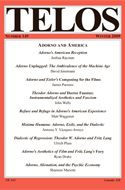As an occasional feature on TELOSscope, we highlight a past Telos article whose critical insights continue to illuminate our thinking and challenge our assumptions. Today, Charles Kollmer looks at David Jenemann’s “Adorno Unplugged: The Ambivalence of the Machine Age,” from Telos 149 (Winter 2009).
 The work of Theodor W. Adorno is replete with paradox, and the abundant and irresolvable tensions in his writings reflect the disheartening milieu in which he wrote. Based on a cursory reading of “The Culture Industry: Enlightenment as Mass Deception,” from Adorno and Horkheimer’s Dialectic of Enlightenment, we might be left with the impression that Adorno wielded this rhetorical weapon in a uniform manner, indicating the ways in which the modern fruits of Enlightenment contradict the original ethos of Enlightenment thought. Indeed, these are difficult charges to refute, as modernity’s myriad episodes of mass violence render notions of teleological “progress” rather untenable. Poststructuralist thought exhibits a reverence for this innovation in thinking. According to Antoni Negri, “Adorno’s model of cultural criticism genuinely uncovered the ontology of the new world” (cited in Jenemann). Yet these same tracts always contain caveats, noting that, despite the paradox and contradiction inherent in modern infrastructure and society, modernity presents us with multitudinous opportunities for radically disrupting the stasis of the status quo. This is the “situation of those who are living through the passage from modernity to postmodernity,” writes Negri. Such caveats imply that Adorno’s critical theory fails to recognize these possibilities for change, at worst typecasting him as a grumpy Luddite.
The work of Theodor W. Adorno is replete with paradox, and the abundant and irresolvable tensions in his writings reflect the disheartening milieu in which he wrote. Based on a cursory reading of “The Culture Industry: Enlightenment as Mass Deception,” from Adorno and Horkheimer’s Dialectic of Enlightenment, we might be left with the impression that Adorno wielded this rhetorical weapon in a uniform manner, indicating the ways in which the modern fruits of Enlightenment contradict the original ethos of Enlightenment thought. Indeed, these are difficult charges to refute, as modernity’s myriad episodes of mass violence render notions of teleological “progress” rather untenable. Poststructuralist thought exhibits a reverence for this innovation in thinking. According to Antoni Negri, “Adorno’s model of cultural criticism genuinely uncovered the ontology of the new world” (cited in Jenemann). Yet these same tracts always contain caveats, noting that, despite the paradox and contradiction inherent in modern infrastructure and society, modernity presents us with multitudinous opportunities for radically disrupting the stasis of the status quo. This is the “situation of those who are living through the passage from modernity to postmodernity,” writes Negri. Such caveats imply that Adorno’s critical theory fails to recognize these possibilities for change, at worst typecasting him as a grumpy Luddite.


